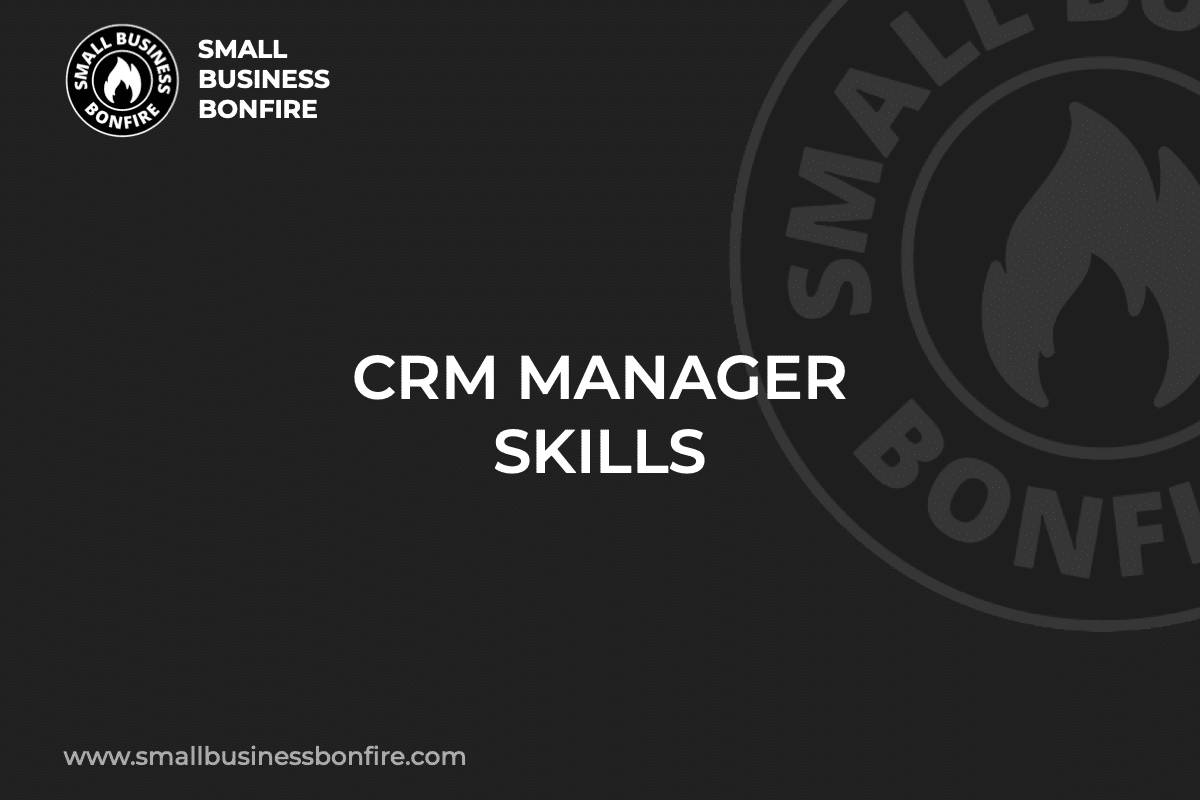Are customer relationship management tasks overwhelming or taking time away from other crucial tasks?
If so, you’re in the right place! Thousands of small businesses give up on CRM software because they don’t have a customer relations manager to handle everything.
Hi, my name is AJ! Over the past decade, I scaled and (recently) sold my company for multiple seven figures.
I started Small Business Bonfire (SBB) to help other entrepreneurs avoid the mistakes I made while building my business!
I’ll be the first to admit that while CRM software is extremely beneficial, it’s also time-consuming. Therefore, knowing the skills that make for an excellent CRM manager is crucial!
Keep reading to learn the CRM skills managers require to ensure your team gets the most out of its CRM software!
Key Takeaways
- CRM managers are responsible for leading teams, analyzing data, and monitoring business processes.
- CRM skills include strong communication abilities, interpersonal skills, and data analysis.
- CRM can be both a skill and a tool.
Related Reading: Best Small Business CRM
SBB Featured Partners
What are CRM Skills?
Customer relationship management (CRM) skills are the qualifications and proficiencies a company requires a customer relations manager to have.
Essentially, CRM skills ensure a customer relationship manager has the skills necessary to perform their job correctly!
CRM managers are responsible for many things, such as:
- Leading teams
- Monitoring sales processes
- Monitoring businesses outcomes
- Making staffing decisions
- Developing and implementing business policies
The primary responsibility of customer relations managers is to oversee the customer experience.
As you can imagine, businesses strive to make each customer experience as efficient and enjoyable as possible.
Therefore, CRM managers try to meet and exceed each consumer’s expectations!
Lastly, because CRM managers are responsible for so many aspects of the business, they must have many skills!
When professionals can effectively manage customer relationships, the following things can happen:
- Departments communicate better and are on the same page
- The company can understand its products and services better
- Teams can make more data-driven decisions
- Businesses can develop stronger brand loyalty
- Customers recommend the brand to others
- Customer engagement rates increase
- Teams can easily identify trends
- Customer service improves
So, is it necessary to highlight customer relationships? YES!
Is CRM a Tool or a Skill?
What is CRM? Is it a skill or is it a tool?
Customer relationship management (CRM) can be both a tool and a skill, depending on the context.
As a tool, CRM refers to software systems that help businesses do the following things:
- Manage their customer interactions.
- Streamline processes such as sales tracking, marketing, and customer service.
- Analyze customer data more efficiently
- Boost sales
- Implement more effective marketing campaigns
These tools can provide a wealth of data about customer behaviors, preferences, and trends.
Still, interpreting and leveraging CRM data requires CRM skills.
Therefore, as a skill, CRM encompasses the ability to effectively manage and foster customer relationships, which involves the following skills:
- Strong communication
- Empathy
- Problem-solving
- Analytical abilities
So, while CRM as a tool provides the infrastructure for managing customer relationships, CRM skills are necessary to use this tool effectively and optimize customer satisfaction!
Examples of CRM Skills
What are some examples of CRM skills? What characteristics should you look for in a customer relationship manager?
Some of the top CRM skills to look for in a manager include the following:
- Interpersonal skills
- Communication skills
- Leadership skills
- Analytical skills
- Professionalism
Below, I’ll explain why each skill is necessary while recruiting customer relations managers!
Interpersonal skills
Interpersonal skills are crucial for CRM managers because they constantly interact with customers and team members.
Therefore, strong interpersonal skills enable managers to do the following things:
- Build and maintain strong relationships
- Boost customer satisfaction
- Improve customer retention rates
Also, excellent interpersonal skills help managers resolve conflicts, understand customer needs, and foster a team spirit among employees!
Lastly, exceptional interpersonal skills allow for effective communication.
As a result of better team-wide communication, businesses can promote a healthy and productive work environment.
Communication skills
Excellent communication skills are a must for CRM managers because they make up the backbone of effective customer relationship management.
Why is it necessary to communicate clearly and efficiently?
When managers communicate correctly, it facilitates clear transmission of information between the team and the customers.
As a result, this ensures that the customers’ needs are understood and met promptly.
Further, strong communication skills allow CRM managers to relay customer feedback to the team, helping to improve and optimize products or services based on customer input.
Lastly, effective communication is necessary for the following things:
- Conflict resolution
- Promoting understanding
- Managing customer expectations
- Enhancing customer satisfaction
- Boosting customer loyalty
Leadership skills
Leadership skills are essential for CRM managers because these employees often lead teams to implement strategies and meet customer satisfaction goals.
These skills help motivate and guide their teams, bringing out the best in each member and fostering a collaborative and productive environment!
On top of that, a proficient leader does the following things:
- Effectively manages team dynamics
- Ensures efficient workflow
- Resolves conflicts
Essentially, leadership is crucial because it’s vital to maintaining positive team morale.
Analytical skills
Analytical skills are another crucial skill for CRM managers because they enable them to make sense of complex customer data and extract actionable insights.
With analytical skills, managers can effectively track customer behavior patterns, preferences, and trends.
As a result of understanding this information, it helps sales and marketing teams customize the customer experience and drive customer satisfaction.
Further, analytical skills allow CRM managers to evaluate the success of different strategies and make data-driven decisions, leading to improved business outcomes.
Lastly, having strong analytical skills helps CRM managers do the following things:
- Identify potential issues before they become problems
- Inact proactive conflict resolution
- Improve customer service tasks
Professionalism
Last but not least, individuals in this position must be professional to manage customer relationships effectively.
Professionalism is indispensable for CRM managers because it fosters trust and respect among customers and team members.
Also, professionalism helps CRM managers handle challenging situations with composure, showing customers they can rely on the company even during difficult times!
Further, a professional demeanor sets the standard for the rest of the team, encouraging a consistent, high-quality customer service experience.
Lastly, professionalism promotes the following things:
- An ethical work environment
- Adherence to policies and guidelines for maintaining customer relationships
- Correctly using CRM software throughout the company
CRM Software Skills
Next, I’ll cover the best CRM software skills a manager must have.
The three primary CRM skills managers should have include the following:
- Technical skills
- Customer satisfaction data management
- CRM data management
With these skills, businesses ensure they get the most out of their CRM software.
Technical skills
Technical skills refer to navigating and effectively using CRM software, including understanding its features and functionalities.
CRM managers with strong technical skills can efficiently organize, track, and analyze customer data stored within the company’s CRM system.
On top of that, managers can leverage advanced features, such as automation and AI, to streamline and enhance customer interactions.
Further, these skills can play a significant role in integrating the CRM system with other business tools to create a unified and efficient work environment.
Therefore, technical skills are indispensable for the following reasons:
- They help maximize the potential of CRM software
- They lead to improved customer relationship management
- They increase the likelihood of overall business success
Customer Satisfaction Data Management
Customer satisfaction data management involves collecting, organizing, analyzing, and interpreting data related to customers’ experiences with a business’s products or services.
Managing client satisfaction data can involve the following things:
- Analyzing various data sources, such as customer reviews, feedback surveys
- Analyzing consumer interactions with customer service
Why is this information crucial for companies?
Consumer satisfaction data provides valuable insights into how well a business meets customers’ expectations and needs!
Therefore, understanding consumer satisfaction data can help a business identify areas of strength and weakness and make adjustments to improve satisfaction levels.
This, in turn, can lead to the following things:
- Increased customer loyalty
- Higher retention rates
- More sales
As you can see, consumer satisfaction data management is a vital CRM skill enabling businesses to understand and improve their customer experiences.
Customer Relationship Data Management
Customer relationship data management refers to the systematic process of collecting, analyzing, and leveraging data related to customer interactions across different channels.
Customer relationship information can include data from the following sources:
- Sales transactions
- Customer service interactions
- Social media engagement
- Marketing campaign engagement
By effectively managing this data, CRM managers can gain a comprehensive understanding of each customer’s history, preferences, and behavior patterns.
Then, teams can use this knowledge to do the following things:
- Personalize marketing efforts
- Improve customer service
- Anticipate customer needs
- Enhance the overall customer experience
Further, understanding customer relationship data can help businesses identify opportunities for upselling or cross-selling, driving revenue growth!
CRM Soft Skills in the Workplace
CRM soft skills are interpersonal and communication skills that enhance the relationship management aspect of CRM.
These CRM skills allow managers to do the following things:
- Effectively interact with customers
- Understand their customers
- Foster a productive and positive work environment within the team
Below, I’ve compiled the soft CRM skills to look for in a manager!
Great Customer Communication
Excellent customer communication is a vital skill for a customer relationships manager because it directly impacts the quality of customer relationships.
Also, efficient customer communication allows CRM managers to do the following things:
- Effectively understand customer needs
- Meet and exceed customer expectations
- Listen to customer feedback and offer excellent customer service
- Facilitate a more personalized, customer-centric business approach
Further, communicating with clients aids in resolving conflicts, handling complaints, and turning negative experiences into positive ones!
Additionally, effective communication ensures clear conveyance of marketing messages.
As a result of better marketing efforts, teams can improve customer engagement and retention rates.
Excellent customer communication fosters better customer relationships, contributing significantly to a company’s growth and success.
Foster Customer Innovation
Fostering customer innovation is a crucial CRM skill because it allows managers to source fresh ideas directly from the people who use their products or services.
By engaging with customers and encouraging them to share their innovative ideas, managers can gain valuable insights to guide product development!
This customer-centric innovation also enhances the customer’s sense of engagement and loyalty, increasing overall satisfaction.
Therefore, fostering customer innovation can result in the following things:
- Improved products and services
- Heightened customer loyalty
- Increased business growth
- Better customer segmentation
- More in-depth customer data
- More effective CRM software
Dress for the Job You Want
“Dressing for the job you want” is an essential CRM skill.
When employees dress for the position they want rather than the one they have, it reflects a professional attitude and demonstrates respect towards the role and the organization.
Also, dressing professionally conveys to stakeholders that you take your job seriously and are committed to maintaining a professional image.
Further, how you dress can influence perceptions, including the following things:
- Impression of your competence
- Credibility to hold a higher position in the company
- Suitability for responsibilities or promotions
Therefore, dressing appropriately is an integral component of professional success.
When you dress professionally, it contributes to the positive image of the company and fosters trust and confidence amongst clients and colleagues!
Review All of Your Work
Reviewing your work as a CRM manager is essential to ensure accuracy, consistency, and effectiveness in managing customer relationships.
Consistently reviewing your work must be a habit if you want to embody the best CRM skills.
For instance, this habit allows you to do the following things with ease:
- Identify and correct errors
- Ensuring the highest quality of customer data analysis
- Confidently base business strategies on data
- Constantly refine business processes
- Implement better operational efficiency
- Experience better customer interactions
Lastly, reviewing your work and reports fosters a culture of accountability and continual improvement, which are crucial to business growth!
Confidence is King
Confidence is king in the workplace, particularly when you manage customer relationships.
For example, confident CRM professionals can make decisions quickly and effectively.
Making decisions quickly is paramount to keeping up with the fast-paced, dynamic nature of customer relationships!
Further, confidence helps foster trust with customers, as they are more likely to believe in the authenticity of a confident individual.
Lastly, a confident leader inspires the same trait in their team, which does the following things:
- Promotes a positive work environment
- Leads to more productivity and better results
- Ensures the company gets the most out of its CRM software
- Allows teams to understand customer behavior better
How to Help Improve CRM Skills
There are several straightforward ways to improve CRM skills, including the following:
- Have employees take a CRM software class
- Require CRM certification for employees who use the software
- Learn from CRM professionals
- Study the CRM industry
- Ask for feedback on your CRM skills
Here’s why these tactics can help you and your team improve your CRM skills!
Have Your Employees Take a CRM Course
CRM tools are powerful and can help businesses improve several aspects of their company.
Still, CRM solutions are only valuable if your team knows how to use them!
Therefore, requiring employees to take a CRM software course is extremely valuable.
When employees take CRM classes, they learn how to do the following things:
- Interpret customer data correctly
- Utilize CRM tools efficiently
- Understand and track customer interactions
- Manage and handle customer complaints efficiently
- Learn the key skills required to drive sales
Even if it’s an entry-level course, CRM training is valuable for all businesses!
Require a CRM Certification
Another way to improve CRM skills within your company is to require CRM certification for certain employees.
Ensuring the teams and individuals who use CRM tools daily actually understand the software is crucial.
Otherwise, you’re going to be wasting money on a CRM system!
Fortunately, several online organizations offer training and certifications for people to work toward on their own time.
Although these certifications cost a bit of money, they’re crucial because customer relations managers oversee many business aspects!
Network with CRM Professionals
What better way to improve CRM skills than by learning from the best in the field?
Joining CRM-related associations allows people to do the following things:
- Build relationships with people in the CRM industry
- Build relationships with people in their business’s industry
- Learn about relevant professional development opportunities
- Discover opportunities to learn more about customer relationship management
Again, learning from CRM professionals is an investment!
Some courses or programs demand a fee, which is worth paying to learn more about how to manage customer relationships.
Study the CRM Industry
Studying the CRM industry is crucial for improving CRM skills because it keeps you up-to-date with the latest trends and technologies.
As a result of studying the latest trends, your CRM strategies are relevant and practical.
Also, studying the industry provides insights into how top businesses leverage CRM for customer satisfaction and retention, allowing you to learn and adopt best practices!
Finally, understanding the industry’s challenges and opportunities can inform better decision-making and strategy development, leading to better customer relationships.
Ask for Feedback on Your Skills
Requesting feedback on your CRM skills is crucial for several reasons.
First, feedback provides a unique perspective on areas of strength and areas needing improvement, enabling targeted development of those skills.
On top of that, receiving feedback does the following things:
- Promotes a culture of continuous learning
- Ensures you and your company continually improve
- Ensures your business keeps up with the dynamic nature of customer relationship management
CRM Training Skills
Below, I’ve compiled some of the best CRM training skills!
Let’s take a look.
1. Data Entry
Data entry refers to the process of inputting information into a computerized database or a specialized software system.
Data entry is a task that is pivotal in CRM because it ensures that all customer data and interactions are accurately captured and stored for analysis and decision-making!
2.Lead Management
Lead management refers to tracking and managing prospective customers, also known as leads.
Lead management involves the following things:
- Nurturing a company’s leads through the sales funnel
- Capturing new business opportunities
- Ensuring sales reps spend most of their time on the highest quality leads
3.Lead Qualification and Nurture
Lead qualification refers to assessing the intention and capability of a potential customer to purchase your product or service.
Essentially, lead qualification helps your team focus on leads with the highest conversion potential.
Lead nurturing, on the other hand, is the strategic process of developing relationships with buyers at every stage of the sales funnel.
The goal of lead nurturing is to guide prospects through every step of the buyer’s journey and progress them toward becoming customers!
4.Time Management
Time management skills refer to using one’s time productively and efficiently.
Further, time management skills involve the following things:
- Planning and controlling how much time to spend on specific activities
- Increasing efficiency, effectiveness, and productivity in CRM tasks
- Ensuring employees always have something to work on
5.Task Management
Task management skills refer to prioritizing and organizing tasks effectively, ensuring they are completed efficiently.
These skills are crucial in CRM, as they enable CRM professionals to do the following things:
- Handle multiple customer interactions
- Organize follow-ups
- Manage data entries
Put simply, task management means handling several tasks without sacrificing quality or missing critical deadlines.
6.Project Management
Project management skills refer to the ability to plan, execute, control, and close the work of a team to achieve specific goals within a specified time frame!
These are critical CRM skills because they facilitate the execution of strategies.
As a result, this ensures every process runs smoothly, and teams meet customer expectations efficiently.
Why Is CRM Training Important?
CRM training is vital for any business intending to build strong, lasting relationships with its customers.
Ensuring team members have CRM skills equips employees with essential skills to effectively manage customer relationships, improving client satisfaction and loyalty!
Also, training in CRM allows businesses to fully leverage their CRM software.
By understanding its functionalities and capabilities, employees can do the following things:
- Utilize CRM tools to their full potential
- Streamline business processes
- Increase productivity
- Correctly interpret customer data
- Facilitate informed decision-making
- Develop strategies tailored to meet customer needs
Further, CRM training fosters a customer-centric culture within the organization.
For instance, a customer-centric culture emphasizes the significance of putting the customer first and promoting a shared vision among team members!
This perspective shifts the business focus from merely selling products or services to creating value for customers, which drives customer retention and business growth.
Additionally, CRM training enhances the ability of employees to manage and handle customer complaints efficiently.
Well-trained personnel are more capable of resolving issues promptly and satisfactorily.
As a result, this leads to improved customer experiences and a positive brand reputation.
Finally, CRM training ensures you keep pace with the dynamic nature of customer relationship management.
Continuous CRM training allows for adaptation and evolution as new technologies and trends emerge.
When your business keeps up with CRM evolutions, it remains competitive in the ever-changing market!
In conclusion, CRM training is a cornerstone for success in managing customer relationships.
Training employees on relevant CRM skills does the following things:
- Empowers businesses to make the most out of their CRM software
- Fosters a customer-centric culture
- Ensures adaptability to changing CRM trends
- Improves client satisfaction and business growth
What to Look for in a CRM Manager Resume
Here are three things to look for on an exceptional CRM manager’s resume!
CRM Skills on the Cover Letter
CRM professionals will make a point to highlight and expand on their CRM skills in a cover letter.
When analyzing these skills, look at how the applicant ties their previous experiences to the current job opening!
CRM Skills on the Resume
Excellent customer relations managers will highlight their CRM skills on their resume.
Typically, you will find these skills under a separate “skills” section of the resume.
CRM Skills in the Interview
Lastly, you can observe some CRM skills in an in-person interview.
For instance, meeting with the applicant face-to-face allows you to ensure they have the following CRM skills:
- Strong communication skills
- Emotional intelligence
- Leadership qualities
- Interpersonal skills
Remember, CRM professionals interact with almost everyone in the company, so they MUST be able to communicate!
CRM Skills Examples
Here are two real-life examples of how employees can use CRM skills in the workplace!
Effective Use of Data Entry and Analysis
A sales representative in a software company demonstrates exceptional data entry skills when they meticulously log every interaction with a potential client into the CRM software.
These entries range from emails and calls to in-person meetings!
Not only does this provide comprehensive customer interaction history, but it also allows for detailed analysis to predict future buying behavior.
Mastering Lead Management and Nurturing
Consider a CRM manager who excels in lead management and nurturing.
They consistently track, qualify, and communicate with potential leads.
On top of that, the manager also develops a strategic nurturing sequence that maintains regular contact with leads at every stage of the sales funnel.
Through the following actions, this manager effectively guides prospective customers toward becoming a paying customer:
- Personalized emails
- Informative webinars
- Relevant content offers
Final Thoughts on CRM Skills
As you can see, hiring a customer relationship manager is extremely valuable!
These managers ensure your company uses its CRM software to the best of its ability by managing teams, communicating effectively, and analyzing data.
Remember, one of the top skills to look for in a CRM manager is effective communication!
What skills is your company looking for in a CRM manager? Let us know in the comments section!
Newsletter Signup
Join The Leads Field Guide Newsletter for tips, strategies and (free) resources for growing your leads, and closing more deals.




